Proudly Introducing the 2025 British Farming Awards Winners:
For thirteen years the British Farming Awards has been shining a light on the best in British Farming.
This year saw a record number of award entries, painstakingly shortlisted by our team of judges, with winners of each category being crowned last night (16 October), VOX Birmingham.
We are thrilled to introduce the winners of the 2025 British Farming Awards below:
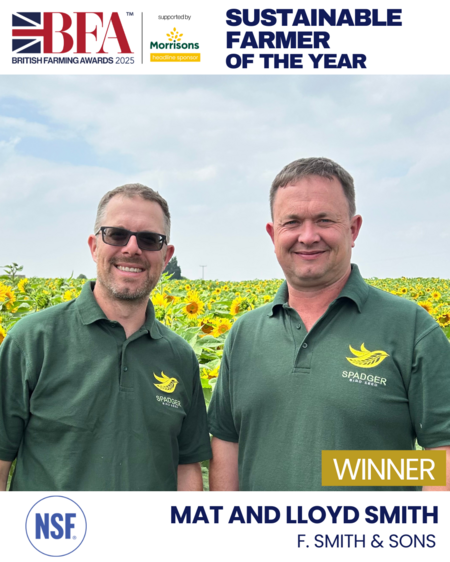
Sustainable Farmer of the Year
Mat and Lloyd Smith
Fourth-generation farmers Mat and Lloyd Smith are proving that commercial success and sustainability can go hand in hand. Farming 198 hectares across owned and tenanted land in the North Cambridgeshire Fens, they manage a diverse rotation of up to 12 crops a year, from wheat and barley to millet, linseed and potatoes, complemented by environmental stewardship.
Their business, F. Smith & Sons, combines innovative soil and water management with biodiversity-focused practices. By introducing strip tillage, inter-row hoeing, and reducing nitrogen use by a third, they’ve cut inputs while maintaining yields. The brothers have also transformed the farm’s wildlife habitats through Countryside Stewardship and SFI, establishing wildflower corners, bird seed mixes and pollinator zones, all while running their own successful offshoot, Spadger Bird Seed, supplying locally grown feed.
Their charity sunflower walk attracts hundreds of visitors annually, raising funds for local causes and fostering community engagement. Recognition has followed, including the BASF Rawcliffe Bridge Sustainability Award, and they now collaborate within the BASF FarmNetwork, sharing best practice across Europe.
With a thriving business model grounded in care for both people and planet, Mat and Lloyd are championing the future of sustainable, resilient Fenland farming.
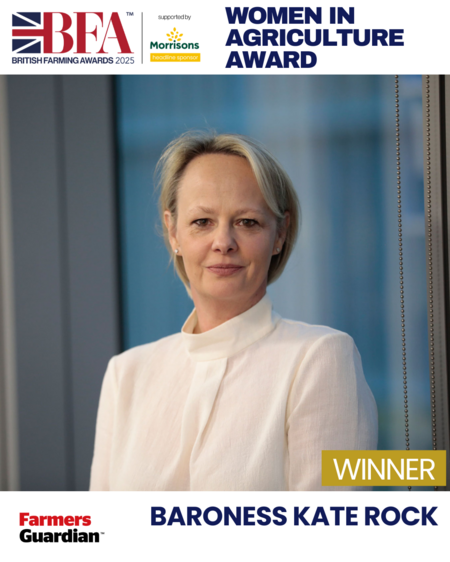
Women in Agriculture Award
Baroness Kate Rock - Dorset
Baroness Kate Rock is a leading advocate for tenant farmers and the wider agricultural sector. A tenant farmer herself, she has used her influence in Government to drive meaningful change. In 2022, she chaired The Rock Review into agricultural tenancies, providing key recommendations to DEFRA on the future of tenant farming in England.
Kate’s impact extends beyond policy. Appointed a Life Peer in 2015, she sits on the House of Lords Select Committee on the Rural Economy and holds multiple non-executive roles, including Chair of Costain plc, Senior Independent Director of Keller Group, and Director of Wrackleford Farms Ltd. She also serves as Director and Trustee of The Royal Countryside Fund, supporting initiatives founded by HM King Charles III.
Throughout her career, Kate has overcome the challenges of navigating male-dominated sectors, demonstrating that expertise, persistence, and leadership can amplify women’s influence in agriculture. She exemplifies how women can lead, shape policy, and inspire the next generation of agricultural leaders.
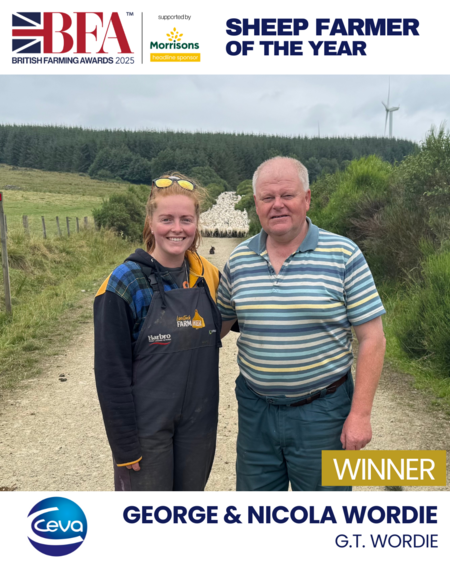
Sheep Farmer of the Year
George and Nicola Wordie
Farming 554 hectares in Aberdeenshire, George and Nicola Wordie run a dynamic mixed enterprise combining suckler cows with 1,040 Scotch Mule and Texel sheep. Their system is built on efficiency, animal welfare, and sustainability, with a focus on adapting to changing conditions and new technology.
The flock, which scans at an impressive 218%, lambs indoors from February to March. Lambs are finished from grass and milk, with triplets managed using an automatic Volac milk machine to improve ewe health and speed up finishing times. A new multi-purpose shed, used for both winter housing and lambing, has helped mitigate weather challenges and enhance productivity.
Innovation underpins the business, from calving and lambing cameras to automatic handling systems that reduce labour and stress. Nicola has also built a powerful social media presence, sharing the realities of farming with over 42,000 followers, promoting agriculture and providing an open space for mental health conversations.
Committed to sustainability, the Wordies engage in long-term environmental schemes, protect wildlife habitats, and run five wind turbines. With Nicola set to join as a partner, the family continues to combine generational experience with modern thinking, championing efficient, responsible, and forward-looking sheep farming in Scotland.
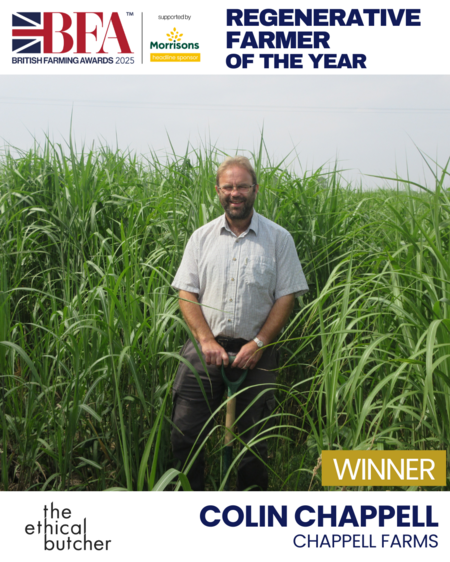
Regenerative Farmer of the Year
Colin Chappell
Colin Chappell runs Chappell Farms, a 485-hectare arable farm in North Lincolnshire, combining owned and tenanted land on heavy clay loams. Adopting regenerative and conservation principles, Colin has transformed the farm with minimal soil movement, cover crops, and diverse rotations, including milling wheat for Warburtons, feed and biscuit wheats, OSR, peas, beans, and maize. A quarter of the farm is dedicated to wildlife and environmental stewardship, while 31ha is in Miscanthus.
Six years ago, a poorly farmed block prompted Colin to focus on soil health and nutrient efficiency. Techniques such as carbon-wrapped nitrogen, renewable phosphate, and strategic catch crops have cut inputs dramatically while maintaining yields, reducing CO₂ emissions by 100 tonnes, and improving soil structure.
Family-run with two full-time employees, Colin also educates 400 schoolchildren annually on sustainable food production. His work balances productivity, resilience, and environmental stewardship, showing that regenerative farming can be both economically viable and ecologically responsible. Through innovation, collaboration, and careful management, Chappell Farms demonstrates the transformative potential of modern regenerative agriculture.
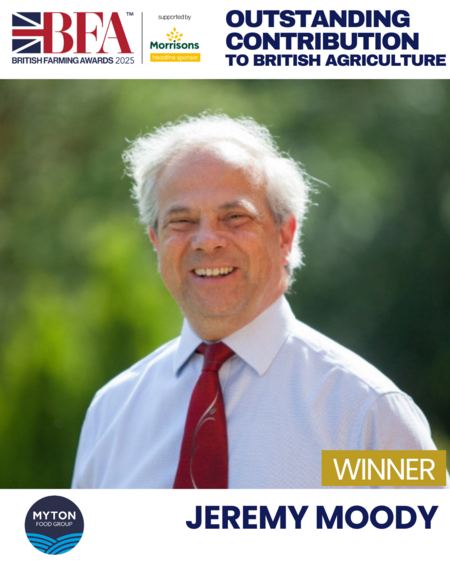
Outstanding Contribution to British Agriculture
Jeremy Moody
For his tireless dedication to agriculture over his career, particularly in the last 12 months in helping the industry fight its corner over the family farm tax and articulating the damaging effects of cuts to agriculture's budget.
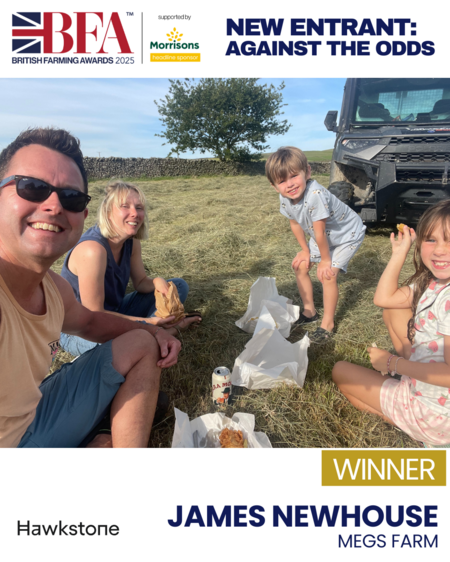
New Entrant Award: Against the Odds
James Newhouse
When aerospace engineer James Newhouse swapped a 20-year career at Rolls-Royce for farming in North Yorkshire, he fulfilled a childhood dream inspired by his shepherd grandfather. With no family farm to inherit, James and his wife Amy purchased 52 hectares of hill land during the Covid pandemic, establishing Megs Farm at 1,000ft elevation.
Today, the business runs Belted Galloway cattle and Swaledale and Herdwick sheep, managed under a regenerative, nature-friendly system. The farm is Pasture for Life certified, with cows outwintered and slow-reared until at least three years old, producing both breeding stock and meat. Sheep are kept pure, with breeding shearlings and lambs sold locally and through meat boxes.
Guided by Yorkshire Dales National Park advisors and supported through Pasture for Life’s mentorship programme, James has embraced rotational grazing, soil health monitoring, and habitat restoration, including wildflower meadow recovery and bird stewardship. This shift has improved resilience against climate extremes while enhancing biodiversity.
Family and community remain central: Amy and their children are actively involved, while neighbours pitch in at haymaking and tree planting. James believes his outsider perspective helps him ask questions, embrace change, and challenge convention, building a sustainable farm that balances productivity, ecology, and heritage.
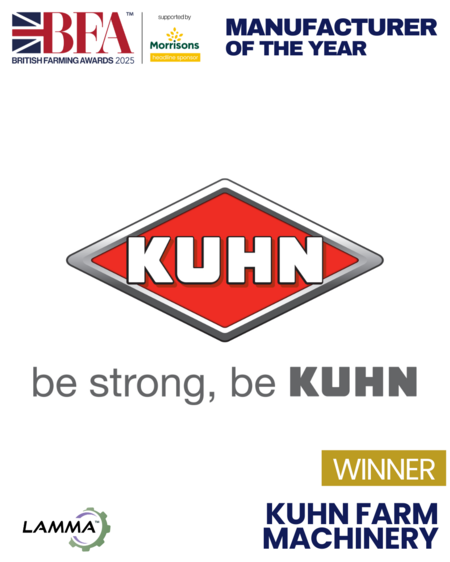
Manufacturer of the Year
Kuhn
Operating from its Shropshire base, KUHN Farm Machinery UK has been serving British farmers for 55 years, bringing a wide range of arable, grassland, feeding, and bedding solutions to market. Over the last five years, KUHN has launched some of its most advanced technologies yet. Highlights include the OPTIMER SST stubble cultivator, winner of a LAMMA 2025 gold award for its Smart Soil Technology, and the AERO 32.1 fertiliser spreader, which delivers precision crop care through KUHN’s MultiRate 4 system. The flagship FC 13460 RA mower conditioner, autonomous KARL tractor concept, AURA self-propelled diet feeder, and baler automation systems underline KUHN’s leadership in innovation.
From 2020 to 2023, sales grew by more than 21%, supported by strong dealer networks and rising adoption of new technologies. Sustainability is central to KUHN’s approach, from developing strip-till solutions that cut fuel and soil disturbance, to working with APE UK on plastics recycling. With close links to Young Farmers, colleges, and schools, KUHN actively champions the next generation while shaping the future of modern, sustainable agriculture.
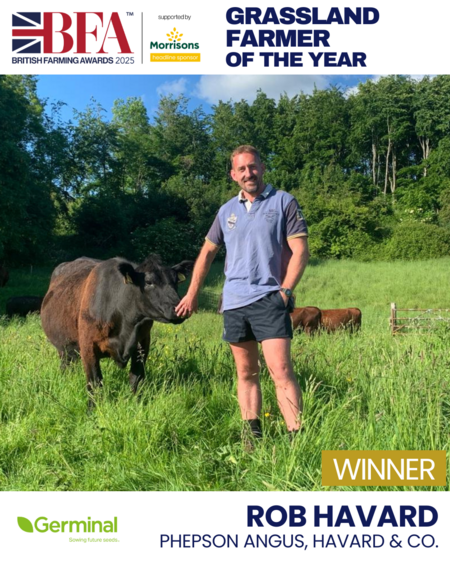
Grassland Farmer of the Year
Rob Havard
At the helm of Phepson Angus / Havard & Co, Rob Havard manages 717 hectares of owned and tenanted land across Worcestershire and Shropshire with his fiancée, Lizzie Hulton-Harrop, and father, David. A sixth-generation farmer and professional ecologist, Rob has become a leading voice in regenerative farming and grass-fed beef production.
His 122-cow pedigree Aberdeen Angus herd, established in 2013, is outwintered and spring-calving, bred to thrive on pasture alone. Fertility sits at the core of the system, with over 90% of females calving in the first cycle last year. Buyers across the UK and Europe seek out Phepson Angus genetics for their hardiness, low-input requirements, and proven performance on grass.
Rob’s success stems from his adoption of Holistic Planned Grazing, introduced in 2012. By mimicking natural migratory grazing patterns, he builds resilience into his pastures, encouraging diverse swards that support both livestock and wildlife. Three standout achievements include growing grass to graze through winter, refining strategies to manage drought, and tailoring species mixes to sustain year-round grazing. The results are clear: healthier soils, higher stocking rates, reduced parasite burdens, and dramatically lower costs.
Looking ahead, Rob is expanding his genetics programme, exporting straws internationally while importing new lines to strengthen grass-fed systems in the UK. Alongside this, he champions carbon sequestration and biodiversity through deep-rooting pastures, wood pasture planting, and wildlife-friendly grazing. For Rob, profitable beef production and ecological restoration are inseparable, making him a true pioneer in grassland farming.
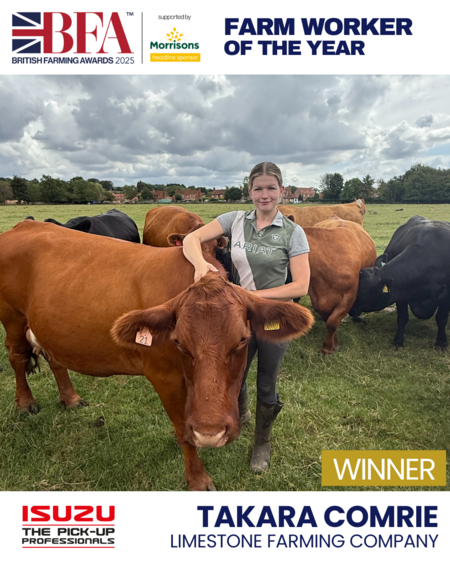
Farm Worker of the Year
Takara Comrie
At just 22, Takara Comrie has already shown resilience and leadership beyond her years. Working at Limestone Farming Company in Lincolnshire, she helps manage a 1,200-hectare farm that runs a large pedigree Stabiliser suckler herd. Each spring, 360 cows calve in a tightly managed system, with everything reared to finish and sold to Dovecote.
When the unit’s head stockman was taken ill last year, Takara stepped up to lead the livestock enterprise with one colleague. She oversaw bedding, feeding, calving, weaning, and herd health while also managing paperwork, records, and routine testing. Thanks to her commitment, the business achieved a smooth calving, successful grazing season, and efficient weaning despite being short-staffed and facing challenging weather.
Takara’s proactive approach has delivered real benefits to the herd. She organises annual bull fertility testing, identifying underperforming animals and protecting herd productivity. Her quick action in detecting coccidiosis within calves ensured fast veterinary treatment and prevented losses. Alongside hands-on stock work, her organisation and efficiency in record-keeping, Red Tractor compliance, and vet coordination have strengthened farm operations.
Having started as a trainee on work experience, Takara continues to learn closely with the farm’s vets, developing her knowledge and skills to become a highly respected herd manager.
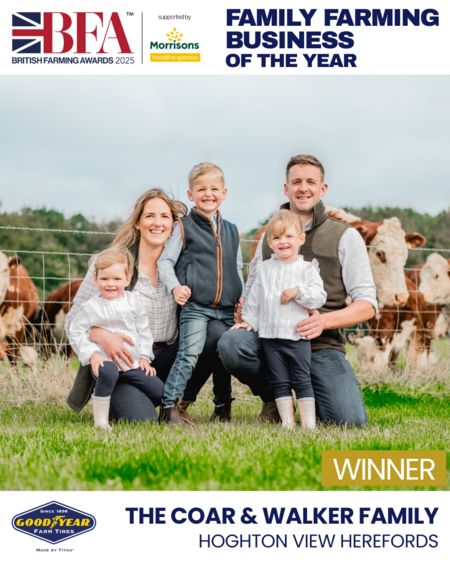
Family Farming Business of the Year
The Walker Family
At Lane Side Farm in Lancashire, the Coar & Walker family run a progressive mixed beef and sheep enterprise built around efficiency, sustainability, and family. Their flock of 1,000 Logie x Aberfield ewes lambs outdoors on a grass-based, New Zealand-style system, without concentrates, selected for easy lambing and strong maternal traits. Alongside this, they manage a herd of 50 pedigree Herefords under the Hoghton View prefix, cattle that have become central to the farm’s identity. Celebrating 12 years with a milestone production sale this June, the herd reflects the family’s focus on structure, longevity, and maternal strength.
The business is a true three-generation partnership. Stephen and Lizzie Walker take the lead on breeding, livestock management, and marketing, while Lizzie’s parents remain actively involved, and even their three young children play a part. Together, they have embraced key innovations such as outdoor lambing, which has reduced labour, cut costs, and improved animal health. Introducing pedigree Herefords has added value, docility, and consistency, making the system more resilient and family-friendly.
With open communication at the heart of their succession planning, the Coar & Walker family balance tradition and innovation to secure a sustainable future for their farm and the wider industry.
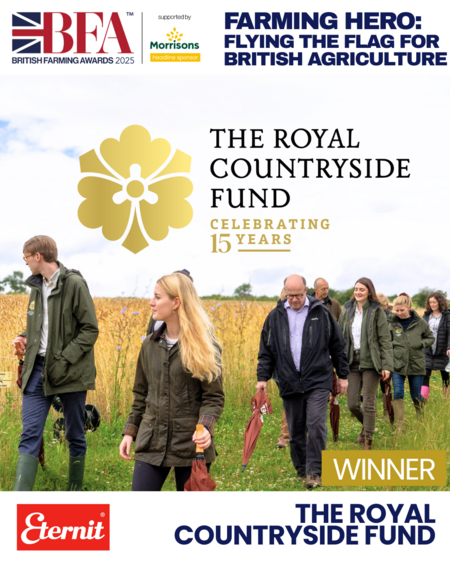
Farming Hero - Flying The Flag For British Agriculture
The Royal Countryside Fund
The Royal Countryside Fund: in recognition of HRH The King and the royal family for consistently promoting and supporting British agriculture.
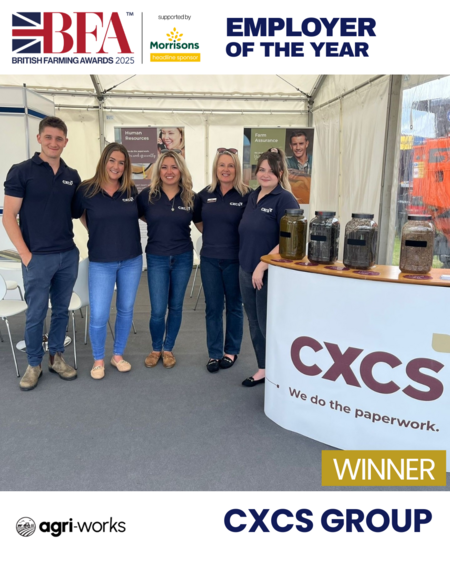
Employer of the Year
CXCS Group Ltd
Herefordshire-based CXCS Group has built its reputation on people. The business, which provides compliance and consultancy services to farmers and landowners, places staff at the heart of its success, ensuring they feel supported, valued, and inspired. Many team members have been with CXCS for more than a decade, while others have returned after parental leave to continue their careers on flexible, family-friendly terms.
A culture of growth runs throughout the company. Staff benefit from structured training, fully funded qualifications, and twice-yearly appraisals with tailored career development plans. The introduction of a client-facing digital portal in 2024 not only streamlined services for over 3,000 clients but also created new development opportunities internally.
Wellbeing is equally prioritised. A dedicated Wellbeing Officer, daily group walks, and flexible working patterns, including hybrid options and a shorter working week, help employees maintain a healthy work-life balance. Regular social events, annual team-building days, and recognition initiatives strengthen morale and encourage open communication. Mental health support is embedded in the business, with staff trained to spot signs of distress in colleagues and clients alike.
This supportive approach has powered CXCS’s remarkable growth, with turnover increasing by 20% year on year since 2020. The business has expanded services in areas such as farm carbon auditing, soil sampling, and stewardship schemes, while also launching CXCS Commercial to support SMEs.
Recognised with awards including Employer of the Year at the Herefordshire Business Awards 2023 and the Cream Awards 2020, CXCS continues to prove that investing in people is the foundation for business success.
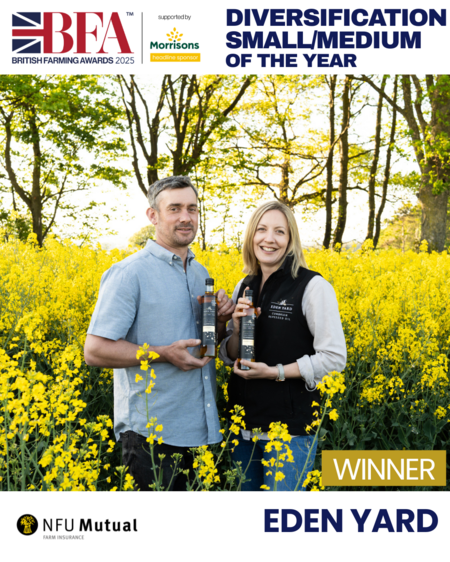
Diversification of the Year (Small to Medium)
Jannike Taylor – Eden Yard
Nestled in the Eden Valley, Cumbria, Eden Yard is proving how farming innovation and local food production can go hand in hand. Run by husband-and-wife team Jannike and Ben Taylor, alongside Ben’s father Alan, the 260-hectare mixed arable and sheep farm has taken a bold regenerative path while building a thriving diversification.
Three years ago, Eden Yard became Cumbria’s first producer of cold-pressed extra virgin rapeseed oil. What began with a passion for local, homegrown produce has blossomed into a celebrated food brand supplying over 75 retailers and many of the county’s Michelin-starred restaurants, including Simon Rogan’s three-starred L’Enclume. Alongside award-winning oils, the range now includes flavoured dressings, mayonnaises, rapeseed honey and Cumbrian flour, developed in partnership with an artisan bakery using the farm’s wheat and heritage grains.
On-farm investment in pressing, bottling and filtering equipment has ensured zero food miles and complete control of quality. Later this year, the Taylors will open a new farm shop showcasing their products and other Cumbrian producers.
Balancing farming with food production, Eden Yard champions short supply chains, sustainability, and community engagement. With school visits, food bank donations, and a clear “Field, Farm, Fork” ethos, they are securing a resilient future for both their farm and the region’s food culture.
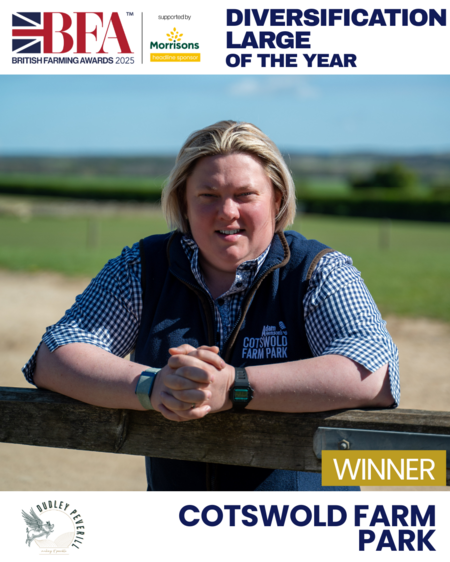
Diversification of the Year (Large)
Cotswold Farm Park
Founded in 1971 by rare-breed pioneer Joe Henson, Cotswold Farm Park has grown into one of the UK’s most iconic examples of farm diversification. Today, under the stewardship of Adam Henson and Duncan Andrews, the 650-hectare Gloucestershire farm blends conservation, education and enterprise to deliver a sustainable rural business model.
At its heart, the Park remains a working mixed farm, with arable rotations and rare and native livestock, many showcased to the public as part of its mission to protect British heritage breeds. The diversification has transformed this foundation into a thriving visitor attraction, welcoming over 170,000 guests annually. Families can enjoy hands-on encounters, seasonal events, and rare breed shows, while school groups benefit from tailored educational visits.
Over time, the offer has expanded to include camping, glamping, events, retail and catering, creating multiple income streams and extending the visitor season. Renewable energy, digital ticketing and strong partnerships further support its resilience.
The results are striking: over 130 staff employed, £400,000 in average monthly sales, and a business model that sustains both farming and public engagement. By balancing tradition with innovation, Cotswold Farm Park continues to inspire visitors while securing a sustainable future for British agriculture.
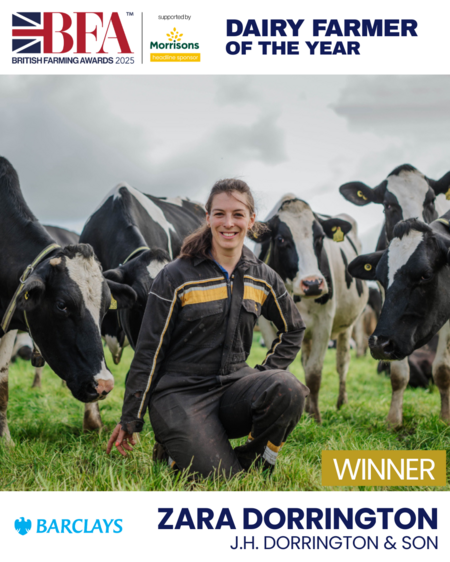
Dairy Farmer of the Year
Zara Dorrington
Lincolnshire farmer Zara Dorrington is driving innovation across her family’s 800-hectare mixed dairy and arable farm, run alongside her father Ross and uncle Simon. With 340 milking cows managed on a summer block calving system, the herd grazes in spring before being housed as conditions dry, while the arable rotation balances combinable, forage and root crops to support both dairy and soil health.
Zara has overseen significant changes in recent years, all focused on efficiency, welfare and sustainability. A new shed has been designed to mitigate heat stress and boost comfort, while a switch to three-times-a-day milking for most of the year has lifted yield. Genomic testing has driven rapid genetic gains, and infrastructure investment, including a slurry separator and extended pipeline, has improved nutrient use, cutting reliance on artificial fertiliser.
The results are striking: mastitis cases have fallen by 80%, saving costs and improving welfare, while yields and milk solids have risen. At the same time, slurry can now be pumped further afield, maximising its value across the rotation.
Looking ahead, Zara is focused on tackling climate volatility with greater water and slurry storage, alongside continued investment in infrastructure to secure long-term resilience.
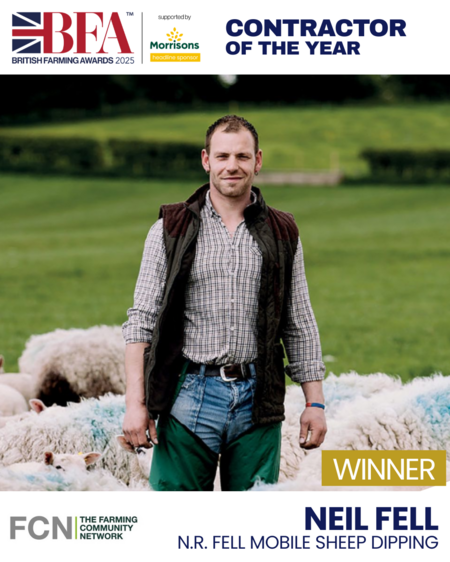
Contractor of the Year
Neil Fell
Durham-based contractor Neil Fell has transformed the way sheep dipping is carried out in the UK. Through his business, N R Fell Mobile Sheep Dipping, Neil specialises in parasite control, offering farmers not only a professional dipping service but also advice on best practice and flock health management. Operating four cage dipping units, the business covers the whole of the UK and works closely with government organisations to promote safe, effective dipping standards.
The idea for the business was born out of necessity. With sheep scab on the rise and limited control options available, Neil saw an opportunity to provide farmers with a UK-wide, affordable and efficient service. His innovative approach has been central to the company’s rapid growth.
In 2016, after several years using a traditional plunge dipper, Neil designed and built his own cage dipper. The new system revolutionised operations, increasing throughput from 1,000 sheep per day to over 4,500. The design also places animal welfare and operator safety at its core, reducing stress for both sheep and handlers. By carrying water and removing waste dip within a single vehicle, the system also cuts time and costs for customers while improving environmental outcomes.
Neil considers the invention of the cage dipper his greatest measure of success, not only for its impact on his business but for the recognition it has brought across the industry. He has helped shape new UK standards and codes of practice for sheep dipping, while international interest has led to discussions about exporting his technology to Romania and the Caribbean.
Customer care is equally important to Neil. Every job starts with a detailed conversation about flock needs and ends with a follow-up call to check on livestock and plan future health strategies. His team also commits to being on farm within five days if a scab outbreak occurs, ensuring urgent problems are dealt with quickly.
Looking ahead, Neil sees growing demand as parasites become more prevalent. With plans to expand into Europe and the Caribbean, and even manufacture his units on a larger scale, his ambition is clear: to raise welfare standards in sheep flocks worldwide.
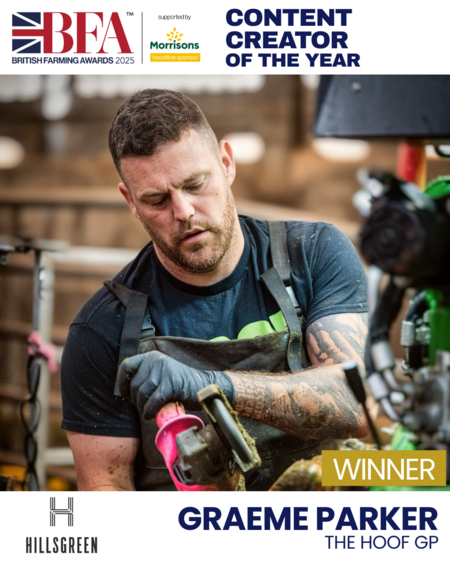
Content Creator of the Year
Graeme Parker - Wigtownshire
With over 8.1 million followers and 110 million monthly views, Wigtownshire’s Graeme Parker, better known as The Hoof GP, has become one of farming’s most influential digital storytellers. Through YouTube and Facebook, he has transformed a niche subject into a global conversation, educating audiences on the critical role of hoof care in livestock welfare and farm profitability
Graeme’s content blends technical expertise with storytelling, offering practical insight into hoof anatomy, trimming techniques, and herd health. His videos have inspired farmers, vets, and even complete newcomers to the industry, with many now qualified hoof trimmers thanks to his influence. “Hoof care has often been overlooked,” Graeme explains, “but showing its direct link to animal welfare and productivity has encouraged wider investment in proper livestock care.”
Beyond farming circles, his work provides transparency for the public, showcasing both the skill and compassion behind modern animal husbandry. Campaigns on mental health, health and safety, and the release of his first book in 2024, which sold 55,000 copies, highlight his wider impact.
Looking ahead, Graeme is expanding into agri-tourism, transforming a 500-year-old farm steading into holiday homes where visitors can connect directly with livestock. With a growing global audience, including new partnerships in China, The Hoof GP continues to put farming firmly in the spotlight.
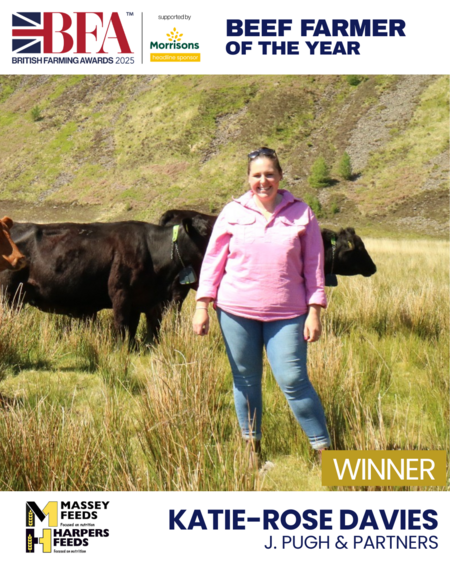
Beef Farmer of the Year
Katie Davies - Glamorgan
Farming 600 hectares across owned and tenanted land in the South Wales Valleys, Katie Davies runs a herd of 45 Stabiliser suckler cows alongside 1,000 Welsh Mountain ewes. The beef enterprise is based on a low-input, grass-based system, with cows out on the hill for nine months of the year and calves sold straight off the cow at six to seven months.
Katie and her husband, Trystan, have transformed the herd since 2019, when poor performance in their pedigree Welsh Blacks prompted a switch in breeding strategy. By introducing Stabilisers, they have harnessed hybrid vigour and genomics to select efficient, fertile, small-framed cows capable of thriving at 2,000ft on marginal grazing. The results are striking: calving at two years old, scanning rates of 102%, virtually no assisted calvings, and mortality at zero. Weaning weights average 250–300kg, with most cows weaning more than 50% of their bodyweight.
In 2025, Katie secured funding for No Fence virtual collars, a pioneering technology that uses GPS to monitor herd movements, create targeted grazing blocks, and improve the management of Sites of Special Scientific Interest (SSIs). This innovation promises to boost grazing utilisation, enhance biodiversity, and support soil fertility while improving animal welfare.
Katie’s vision is rooted in sustainability. Independent research shows Stabiliser-based systems emit 40% less carbon than the UK average, helping her business stay ahead of net zero targets. Beyond the farm gate, she is exploring collaboration with South Wales Fire Service to use cattle in wildfire prevention by creating natural firebreaks, and with her local authority on peatland restoration. Blending science-led breeding with cutting-edge grazing technology, Katie Davies is proving that suckler cows can be both profitable and pivotal in managing upland environments for the future.
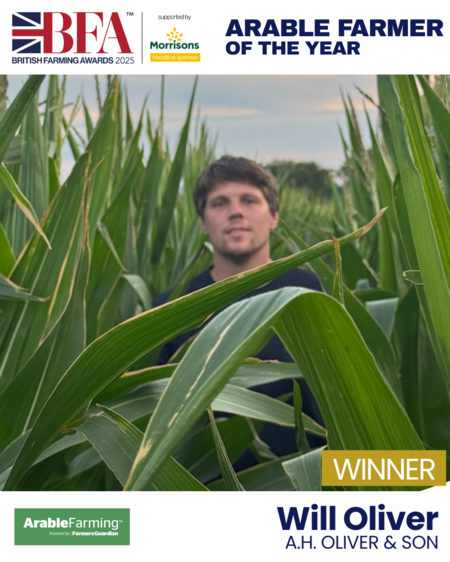
Arable Farmer of the Year
Will Oliver - Warwickshire
In the heart of Warwickshire, arable farmer Will Oliver is showing how innovation, efficiency and environmental care can work together. Growing winter wheat, winter beans and grain maize, his system focuses on soil health, reduced inputs and maximising Sustainable Farming Incentive options, all while producing quality food.
The family business is run with his father Alfred and younger brother, alongside two long-serving arable staff.Paul, with the team for nearly 37 years, is the sprayer operator and combine driver; George, after eight years, is the mechanic, fertiliser spreader operator and lead drill man. Will’s wife Polly manages a glamping and dog-walking venture, hosting weekly farm walks to connect visitors with modern farming. BASIS and FACTS qualified, Will undertakes all agronomy in-house. His approach is largely no-till, with light cultivations before maize to incorporate poultry manure from the family’s 2,000-tonne litter resource. Grain maize has replaced oilseed rape, creating a niche market while enabling better manure use and integration of rye/vetch cover crops grazed by local Suffolk sheep.
Innovation is central to the business: hoeing, companion cropping, zero insecticide use, and trials with partners such as BOFIN, Syngenta, LG Seeds and Agrovista. Will’s work on the NFU National Crops Board and RB209 Panel keeps him close to emerging policies, especially those affecting nitrogen use efficiency, a personal focus for improving profitability and sustainability.
The shift to grain maize has opened supply opportunities to local farms, shoots and potentially the bird feed and pet sectors. Each enterprise within the business is run as a separate entity to monitor true performance, ensuring the arable operation stands on its own.
With legislation, climate pressures and market volatility ahead, Will believes resilience and adaptability are vital. Opportunities lie in carbon markets, robotics, gene editing and precision data use to boost efficiency without sacrificing yield.
Cover cropping, reduced tillage, targeted logistics and intensive soil monitoring underpin his contribution towards Net Zero by 2040, backed by a commitment to continuous learning and results-driven change.
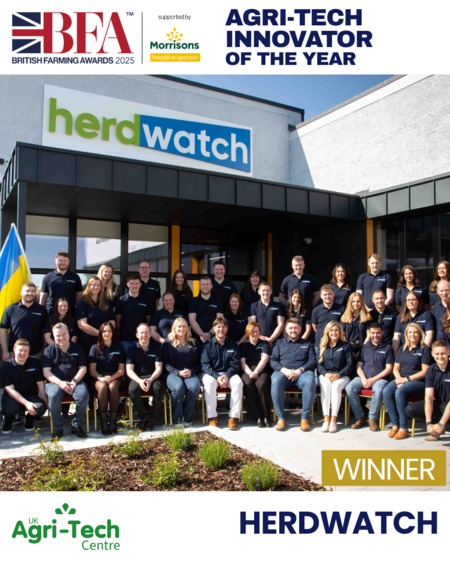
Agri-tech Innovator of the Year
Herdwatch - Shropshire
Herdwatch, based in Shropshire, is transforming livestock management for over 22,000 farmers across the UK and Ireland. The mobile-first platform replaces paperwork with real-time recording of herd events, from treatments and breeding to grass growth and compliance, while integrating seamlessly with statutory databases, parlour software, weighing systems, and animal health sensors.
In 2025, Herdwatch launched Herdi, agriculture’s first context-aware AI assistant, designed to turn complex, siloed data into right-time, practical advice. Built directly into the app, Herdi combines a farmer’s own records with external factors like weather, regulations, and market conditions to give tailored, reference-backed answers in seconds, whether identifying underperforming cows or advising on fertiliser timing.
By saving hours each week, simplifying compliance, and supporting better decision-making, Herdwatch and Herdi are making precision farming accessible to beef, dairy, and sheep producers of all sizes, helping boost profitability, sustainability, and welfare across the sector.
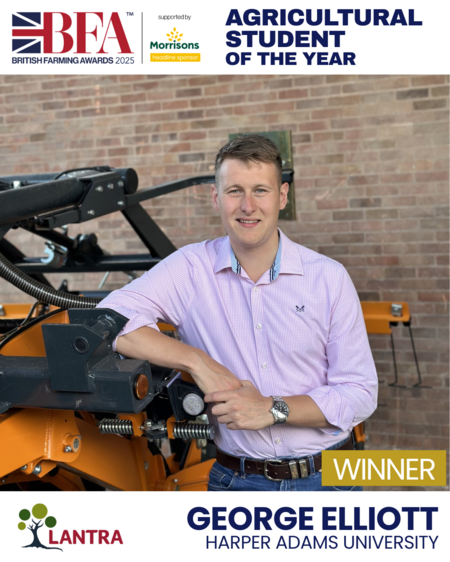
Agricultural Student of the Year
George Elliott – Derbyshire
Agricultural Student of the Year finalist George Elliott, has carved an impressive path in the farming sector, fuelled by a fascination with machinery, innovation, and sustainable agriculture. Currently in his final year of an Agriculture with Mechanisation degree at Harper Adams University, George’s journey began on his grandfather’s smallholding, evolving into a career-defining placement and scholarship with JCB Agriculture.
Despite not coming from a traditional farming background, George has immersed himself in every opportunity, from hands-on arable work to precision machinery and business management. His academic excellence, leadership roles mentoring younger students, and contributions to industry discussions showcase his commitment to shaping the sector’s future. His final-year research on agricultural telematics reflects his drive to harness data to boost machinery performance and farm efficiency.
Beyond his studies, George is active in Young Farmers, a Grade 6 pianist and organist supporting rural community events, and an entrepreneur buying, restoring, and selling vintage machinery. These ventures have honed both his technical and business skills, strengthening his understanding of agricultural heritage and innovation.
His vision for the industry tackles some of farming’s most pressing challenges: low adoption of precision technologies, environmental pressures, and labour shortages. George is passionate about demonstrating the real-world benefits of AI-driven insights, variable rate applications, and sustainable machinery strategies to farmers both in the UK and abroad.
After graduation, George will take up a full-time role as an Agricultural Sales Engineer with JCB, with ambitions to pursue a master’s degree and a Nuffield Farming Scholarship. In the long term, he aims to lead innovation in agricultural machinery, ensuring farming remains efficient, profitable, and environmentally responsible.
For George, winning this award would be a platform to champion precision farming and inspire the next generation of agricultural innovators.
